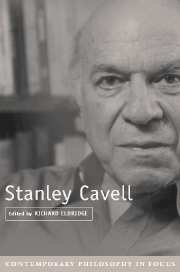Book contents
- Frontmatter
- Contents
- List of Contributors
- Stanley Cavell
- 1 Introduction: Between Acknowledgment and Avoidance
- 2 Stanley Cavell and Ethics
- 3 The Names of Action
- 4 Stanley Cavell's Vision of the Normativity of Language: Grammar, Criteria, and Rules
- 5 Aesthetics, Modernism, Literature: Cavell's Transformations of Philosophy
- 6 A Second Primavera: Cavell, German Philosophy, and Romanticism
- 7 Cavell on American Philosophy and the Idea of America
- 8 “Disowning Knowledge”: Cavell on Shakespeare
- 9 Cavell on Film, Television, and Opera
- Brief Annotated Bibliography of Works by and about Stanley Cavell
- Index
8 - “Disowning Knowledge”: Cavell on Shakespeare
Published online by Cambridge University Press: 08 January 2010
- Frontmatter
- Contents
- List of Contributors
- Stanley Cavell
- 1 Introduction: Between Acknowledgment and Avoidance
- 2 Stanley Cavell and Ethics
- 3 The Names of Action
- 4 Stanley Cavell's Vision of the Normativity of Language: Grammar, Criteria, and Rules
- 5 Aesthetics, Modernism, Literature: Cavell's Transformations of Philosophy
- 6 A Second Primavera: Cavell, German Philosophy, and Romanticism
- 7 Cavell on American Philosophy and the Idea of America
- 8 “Disowning Knowledge”: Cavell on Shakespeare
- 9 Cavell on Film, Television, and Opera
- Brief Annotated Bibliography of Works by and about Stanley Cavell
- Index
Summary
The limits of my language are the limits of my world.
Ludwig Wittgenstein, Tractatus Logico-PhilosophicusBy the time Stanley Cavell arrives at his discussion of Othello near the end of The Claim of Reason, the reader is more than amply prepared for an encounter with the exorbitance of Shakespeare's text. And yet nothing that Cavell writes prior to the conclusion of that book suggests in any particular way that an analysis of Shakespeare is in the offing. The Claim of Reason is hardly systematic enough for its itinerary to be predicted; but even more important, it seems to prove that one need not read Shakespeare in order to drive language to its limits: one need only possess an unstinting attention to, and ear for, the weight of what we say. The disclosure of our commitments in what we say, together with an account of what it means to honor or to skirt them, is as important as anything in Cavell's work. It is this project of disclosure and of accounting that led him, in the early essays that comprise the volume Must We Mean What We Say?, to take the language of sight in King Lear as the basis for a breathtakingly broad discussion of the problem of acknowledgment and the avoidance of love in that play. The issues of skepticism, knowledge, and the efforts of human beings to avoid acknowledgment are among the most prominent themes in his Shakespearean essays.
- Type
- Chapter
- Information
- Stanley Cavell , pp. 190 - 205Publisher: Cambridge University PressPrint publication year: 2003

